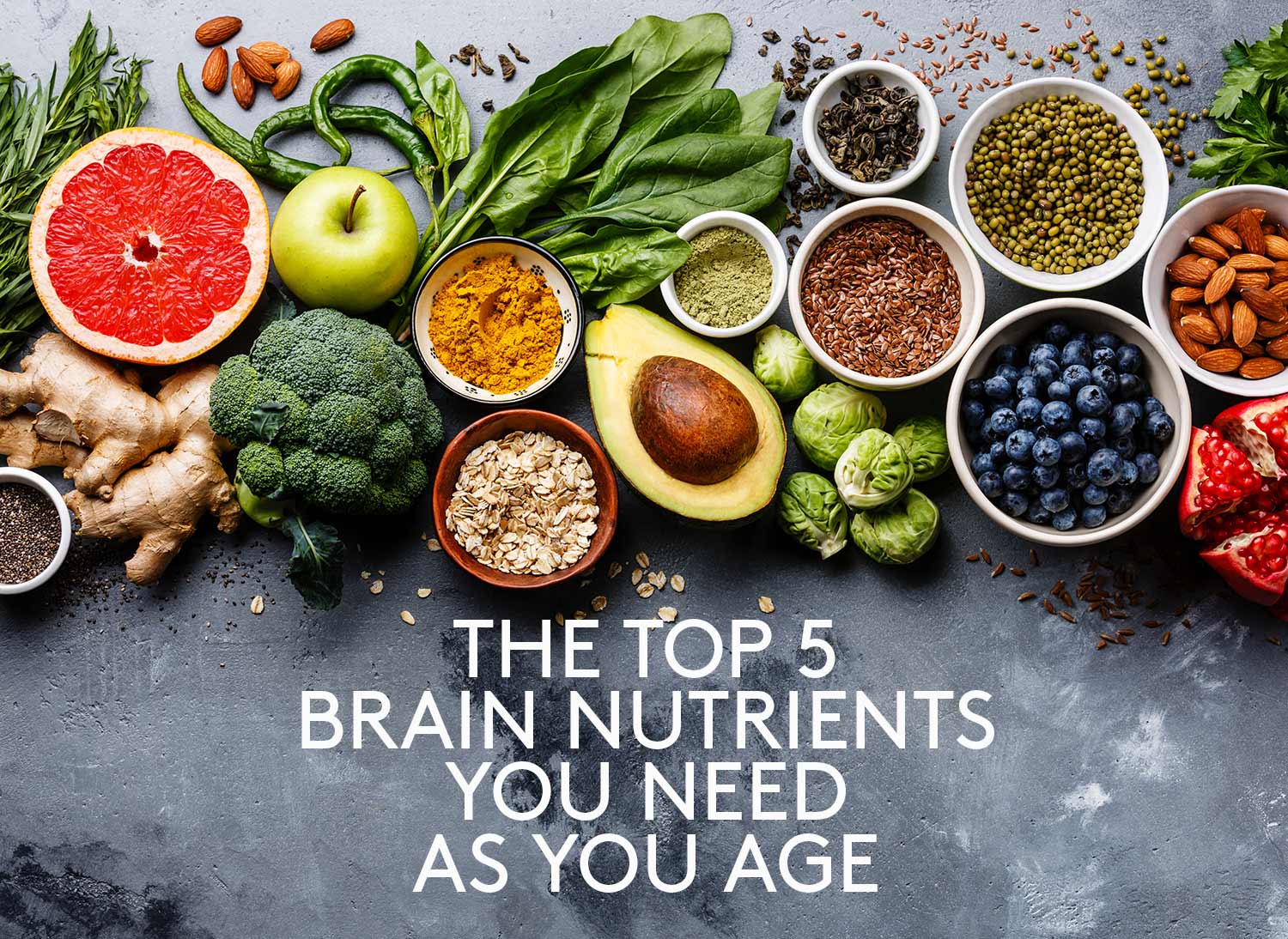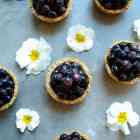The Top 5 Brain Nutrients You Need As You Age

At NeuroTrition we want you to lead a long, healthy life. And because we know good brain health is central to wellbeing, we’re all about helping you build — and maintain — your healthiest, happiest brain.
September is World Alzheimer’s Month AND Healthy Aging Month, so I wanted to share some solid science behind KEY nutrients you need to keep your brain health optimal as you age. We’ve written previously on the two key diets that have been shown to shave years off your brain age. But what are the actual NUTRIENTS in these diets that are probably responsible for staying sharp into our golden years? Turns out there are some nice data on these specific nutrients, and thankfully they’re pretty tasty too!
But first, I want to talk about the biggest culprit in the aging brain and its connection to food. This background is important.
What Is Dementia?
With improvements in modern medicine over the past century our life expectancies have dramatically increased (1), but as the population gets older, the issue of age-related disease increases — particularly dementia.
Dementia is an umbrella term for the deterioration of brain function. It can include issues with memory, thinking and problem-solving and has an immense impact on daily life and wellbeing — for both those affected and their families. Alzheimer’s disease is the most common form of dementia, accounting for half of all dementia cases.
According to recent data (1), 7% of the population in Canada over 65 years has dementia. Aging is the leading risk factor for dementia — a quarter of people over 85+ years have dementia.
Is Dementia Related To What We Eat?
Sadly, we can’t reverse or slow down time (although we’d really like to), but we know that nutrition is a key foundation of brain health. And that a lack thereof is detrimental to brain and mental health.
Junk food isn’t good for our brain or our body. Being overweight or obese is a significant risk factor for developing dementia, and diets full of sugary and poor quality fatty processed foods impair memory function, regardless of weight status (2). In fact, we have enough evidence to now suggest that Alzheimer’s might even be a “Type 3 diabetes.”
Aside from cutting out junk foods from our diet, which is a must for optimum brain and mental health (but can be really hard to do) what else can we do? Neuroscientists and NeuroTritionists are investigating how certain foods that contain brain-boosting nutrients can maintain brain function as we age, and also potentially reduce our risk of developing dementia. Please keep reading for my science-backed favourites that are part of our NeuroTrition Rx for healthy brain aging.
The Top 5 Brain Nutrients You Need As You Age (plus one bonus that I am literally addicted to)
1. Flavonoids and Antioxidants
Scientists have discovered many different kinds of antioxidants (compounds that fight free radicals, aka. oxidants, hence the term antioxidant) in our whole foods, and particularly in colourful vegetables and fruit. For example, berries, particularly blueberries, are rich in a chemical compound called anthocyanin — a particularly powerful antioxidant. Anthocyanin gives fruits and veggies their purple, blue or red colour. Other foods that contain high levels of anthocyanin include eggplant, kidney beans and grapes (and also red wine!). Berries are also high in antioxidant flavanols, in the flavonoid group of plant-derived nutrients.
The antioxidants in foods are important because they combat the everyday oxidative stress and free radicals our cells are exposed to (like UV exposure and pollutants) and they also reduce damage to neurons (i.e. nerve cells) in conditions like Alzheimer’s disease (3). Stress, poor diet and aging all increase free radicals that cause inflammation and neuron damage in the brain (4). So, diets high in antioxidant containing foods may help prevent age-related decline.
2. Monounsaturated Fatty Acids
You’ve heard of “good fats” and how important they are for your health, right? Monounsaturated fatty acids (MUFAs), like in olive oil and avocados, are one such good fat you want in your diet. Diets high in MUFAs are often called "Mediterranean diets" and have well documented positive benefits for the brain and mental health (5). Diets high in MUFAs increase the levels of acetylcholine — an essential brain chemical for learning and memory. Reduced brain acetylcholine is seen in Alzheimer’s disease (6), and memory enhancing drug treatments for Alzheimer’s disease often work by increasing acetylcholine levels.
3. Omega-3 Fatty Acids
You’ve probably heard of omega-3 fatty acids being great for brain health. Oily fish including sardines, salmon and mackerel are great sources of polyunsaturated fatty acids (PUFAs), another “good fat”, and are high in omega-3s. If you don’t eat fish, plant-based sources of omega-3s also exist including seeds like hemp, flax and chia seeds; cruciferous veggies like Brussel sprouts and broccoli; and nuts including walnuts (they even look like brains!).
Omega-3 fatty acids are super important in our brains as they are major parts of the cell membrane that forms neurons (aka. nerve cells), allowing them to function properly. As a result, diets high in omega-3s can keep the aging brain healthy and could decrease the risk of dementia (7)(8).
4. An Anti-Inflammatory Powerhouse
The ancient spice turmeric has been used in the Middle East and Asia for centuries for its health benefits. Turmeric gives Indian foods their vibrant yellow colour and is also pretty delicious as a turmeric latte (or golden mylk ice cream!). But more than making foods delicious, turmeric is proving great for protecting brain function. The key chemical in turmeric is curcumin, a potent anti-inflammatory that is being studied for treating arthritis (9). But beyond its effects in the body — curcumin also acts as an anti-inflammatory in the brain and may be protective against Alzheimer's disease (10). And now we’re starting to see that it’s the entire family of “curcuminoids,” including but not limited to curcumin, in whole turmeric, that are beneficial.
As we age, the number of newly generated neurons in the hippocampus (a key area of the brain for forming memories) decreases. These new neurons keep your memory sharp. Research has shown that lab rats that were fed diets containing curcumin had increased numbers of neurons in the hippocampus and had better memories (11)!
5. L-theanine
Green tea or matcha contains the amino acid L-theanine (as well as some caffeine, so if you struggle with anxiety and/or insomnia please keep it to before 12:00 noon).
L-theanine produces the brain chemical GABA. Increasing GABA in the brain can promote mental clarity and relaxation (12). Chronic stress is terrible for memory function and increases the risk of developing dementia, so supplementing diets with L-theanine might help reduce the repercussions of our stressful lifestyles on our brains. Green tea is also high in antioxidants and a study from Japan linked drinking green tea to a lower incidence of dementia and Alzheimer's disease (13).
6. Bonus Nutrient: Caffeine
Many people wake up in the morning and the first thing they drink is a cup of coffee, which contains the brain stimulant caffeine. Coffee makes me feel more alert and readier to take on the challenges of the day…plus, I am fully aware of the fact that I am addicted to it, so I consume it to prevent going into withdrawal.
Now, we do NOT recommend coffee, or any caffeinated beverage for that matter besides green tea, at NeuroTrition. BUT there is some interesting science suggesting caffeine might be good for the brain. For example, it has been shown to protect neurons from damage (14) as well as (and this is anecdotal evidence) protecting those around me from my morning grumpiness!
My Final Food For Thought: Food Or Supplements?
Science is starting to tell us that many of these brain boosting superfoods are so good for us because they contain antioxidants. Interestingly, the data suggest that these antioxidants may be more effective when obtained from whole foods rather than supplements, because supplemental pills or powders can contain excessively high concentrations of these chemicals. In fact, taking too many antioxidant supplements can decrease the brain benefits of physical exercise (which is also super important for healthy aging) (15) and could increase your risk of certain cancers (16).
It appears that perhaps just-the-right-amount is best in this case, and that for smooth sailing ahead into your golden years it’s about getting these nutrients through as many whole food sources as possible.
- References
-
- Life expectancy in Canada https://www150.statcan.gc.ca/n1/pub/11-630-x/11-630-x2016002-eng.htm
- Attuquayefio, T., Stevenson, R. J., Oaten, M. J., & Francis, H. M. (2017). A four-day Western-style dietary intervention causes reductions in hippocampal-dependent learning and memory and interoceptive sensitivity. PLoS One, 12(2), e0172645.
- Spencer, J. P. (2010). The impact of fruit flavonoids on memory and cognition. British Journal of Nutrition, 104(S3), S40-S47.
- Bisht, K., Sharma, K., & Tremblay, M. È. (2018). Chronic stress as a risk factor for Alzheimer's disease: roles of microglia-mediated synaptic remodeling, inflammation, and oxidative stress. Neurobiology of stress, 9, 9-21.
- H Ferreira-Vieira, T., M Guimaraes, I., R Silva, F., & M Ribeiro, F. (2016). Alzheimer's disease: targeting the cholinergic system. Current neuropharmacology, 14(1), 101-115.
- Jacka, F. N., O’Neil, A., Opie, R., Itsiopoulos, C., Cotton, S., Mohebbi, M., ... & Brazionis, L. (2017). A randomised controlled trial of dietary improvement for adults with major depression (the ‘SMILES’ trial). BMC medicine, 15(1), 23.
- Morris, M. C., Evans, D. A., Tangney, C. C., Bienias, J. L., & Wilson, R. S. (2005). Fish consumption and cognitive decline with age in a large community study. Archives of neurology, 62(12), 1849-1853.
- Cole, G. M., Ma, Q. L., & Frautschy, S. A. (2009). Omega-3 fatty acids and dementia. Prostaglandins, Leukotrienes and Essential fatty acids, 81(2-3), 213-221.
- Daily, J. W., Yang, M., & Park, S. (2016). Efficacy of turmeric extracts and curcumin for alleviating the symptoms of joint arthritis: a systematic review and meta-analysis of randomized clinical trials. Journal of medicinal food, 19(8), 717-729.
- Reddy, P. H., Manczak, M., Yin, X., Grady, M. C., Mitchell, A., Tonk, S., ... & Kumar, S. (2018). Protective effects of Indian spice curcumin against amyloid-β in Alzheimer’s disease. Journal of Alzheimer's Disease, 61(3), 843-866.
- Dong, S., Zeng, Q., Mitchell, E. S., Xiu, J., Duan, Y., Li, C., ... & Zhao, Z. (2012). Curcumin enhances neurogenesis and cognition in aged rats: implications for transcriptional interactions related to growth and synaptic plasticity. PloS one, 7(2), e31211.
- Dietz, C., & Dekker, M. (2017). Effect of green tea phytochemicals on mood and cognition. Current pharmaceutical design, 23(19), 2876-2905.
- Pervin, Monira, Keiko Unno, Tomokazu Ohishi, Hiroki Tanabe, Noriyuki Miyoshi, and Yoriyuki Nakamura. "Beneficial effects of green tea catechins on neurodegenerative diseases." Molecules 23, no. 6 (2018): 1297.
- Tellone, E., Galtieri, A., Russo, A., & Ficarra, S. (2019). Protective effects of the caffeine against neurodegenerative diseases. Current medicinal chemistry.
- Ji, L. L., Gomez-Cabrera, M. C., & Vina, J. (2006). Exercise and hormesis: activation of cellular antioxidant signaling pathway. Annals of the New York Academy of Sciences, 1067(1), 425-435.
- Kryston, T. B., Georgiev, A. B., Pissis, P., & Georgakilas, A. G. (2011). Role of oxidative stress and DNA damage in human carcinogenesis. Mutation Research/Fundamental and Molecular Mechanisms of Mutagenesis, 711(1-2), 193-201.








